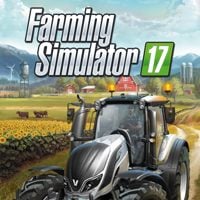Farming Simulator 17: Grass, Hay and Ensilage
This chapter contains a few tricks for better grass and hay harvests, and making them into ensilage - which can be sold for a good price or made into compost.
Grass is the most common element of the game, but its paramount for animal husbandry. You'll find information on grass, hay, and ensilage and how to acquire it below.
Grass - basic info
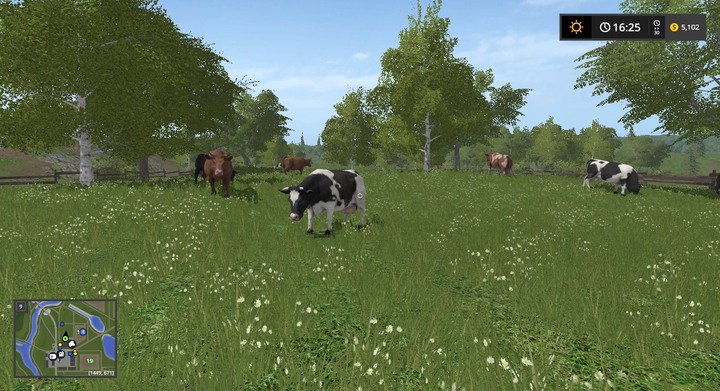
Primarily, grass is used as animal feed. It can be dried up to receive hay, or placed into concrete prisms to be processed into ensilage. Both products will work well as feed. Grass can be harvested from any location, it doesn't have to be from your lots. However, if you are an advanced stages of animal husbandry, you may use the option of automatic grass harvest - in this case, you need to sow a field with grass, so your employee can take over. Don't use numbered fields - create a small field using a plow.
Grass grows very fast. It can be stored anywhere, as it doesn't fall to decay. You can even mow it down and leave at the field for later harvest - it won't change into hay until you use a tedder on it. However, you should know that if you won't gather the mowed down grass/hay, new crop will grow in the same location anyways! Use a loading wagon (cheapest one for 31 000$).
Uses:
- Basic feed for sheep, secondary for cows;
- It can be processed into hay using a tedder;
- It can be processed into ensilage by placing it into prisms;
- Ensilage brings profits, so keep harvesting grass.
Methods of Harvesting Grass
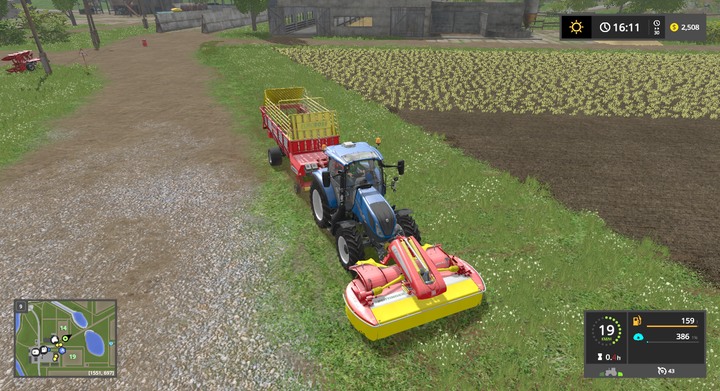
Grass harvesting is possible using only a mower and a loading wagon. You can install a front mower [make sure that your tractor allows it] (Pottinger Novacat 301 ED - 11 000$) and a back trailer, to gather the mowed grass. In case of more portions, you need to divide the process into two stages: mowing and gathering.
Important note - the grass can be harvested anywhere. Your employees can only harvest from lots sown with grass. The employees cannot be assigned only to gather grass / hay - as a result, either choose the first method with a front mower and a semi-trailer or prepare huge amounts to gather at once, to avoid making the same trip over and over.
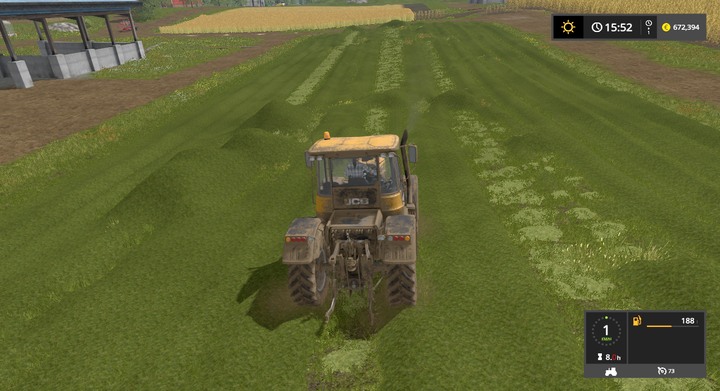
Remember that new grass constantly grows underneath the rolls of that already mown! To shorten the amount of time needed for harvesting grass (especially individual gathering) you can mow the same area few times a day without gathering the cut grass. When the amount of cut grass satisfies you, spend a few moments on gathering it - you'll fill your trailer few times without any problems - this method works well because you have to put all grass to the prism at once . Until you use the ensilage in full, you cannot put more grass in it.
Grass can also be placed into bales. It's a very expensive option, not recommended in the early phase of the game. It is useful when there are huge amounts of grass to transport - grass formed into bales is much easier to transport, than an unsorted one in a self-loading trailer.
Hay
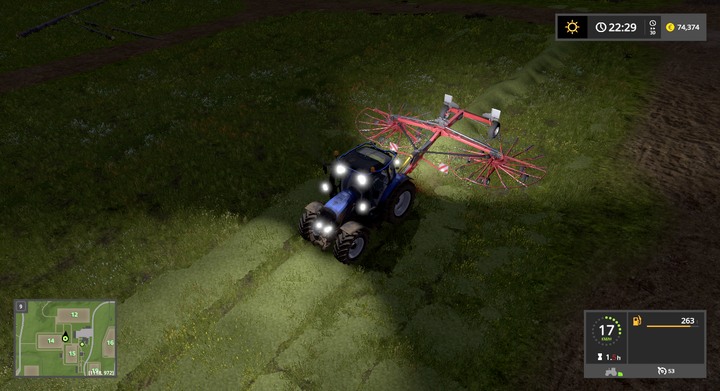
Hay is dried-out grass (at least in theory). In Farming Simulator 17, all you have to do is to use a tedder (the cheapest model costs 11 000$). It throws the grass around which becomes hay instantly. Unfortunately, this process cannot be performed simultaneously with gathering - the tedder is connected to the back of the tractor.

Hay is comfortably stored in a hayloft (90 000$), but can just lie on the field after teddering (new grass will grow underneath).
Uses:
- Basic feed for sheep and cows;
- Easy to transport after forming it into bales;
- The ability to comfortably transport it when made into bales, and processing it into ensilage after coating it with foil (in bale form)
Methods of Harvesting Hay
As mentioned before, to get hay, go through the mown grass using a tedder and put it into a loading wagon. A windrower can be useful (cheapest one available for 9 600$). Hay rakes form the lying around hay into an easy-to-gather "bales", similarly to mown grass. The more expensive rakes create bigger bales (from a larger area), so you should quickly switch to a better model (as it shortens the time needed for harvest).
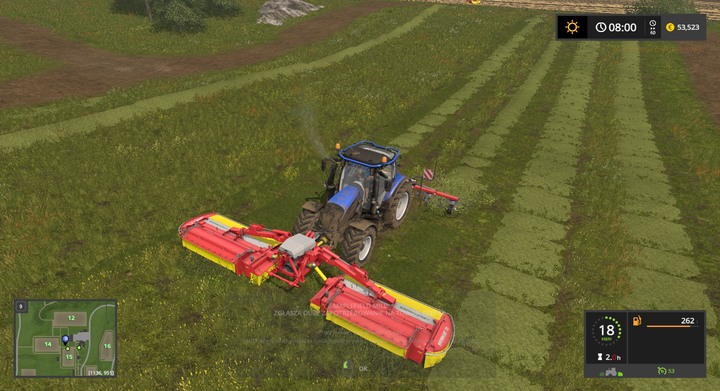
To make hay harvesting faster, the initial stages of the game allow this trick: install a "double" mower (e.g. Pottinger Novacat X8 ED - 42 000$). Install the smallest tedder (Vicon Fanex 604 - 9 600$). Mow the grass, leaving an empty lane. Without a lane in the middle, the tedder will leave two lanes of hay in the same form as the grass before (2 lanes). You won't get the most out of the lot, but this automatized process leaves you a neatly folded bales without having to use (or buy) a windrower. This trick is especially useful when you don't have to worry about the amount of grass - you are gathering it from meadows, rather than your lots.

You can also use the method that was described in the chapter on harvesting grass. Instead of ransacking and picking up hay instantly after mowing, mow the grass daily for a few days without picking it up - new grass will grow underneath. When you have large heaps of grass on your field, drive a tedder through them and gather the hay. Watch out - if you are planning to pick up the grass and throw it in another location, this method may not work - the tedder doesn't work so well with whole heaps made out of grass.
Hay can be gathered using the machines from the bale technology. After pressing, it takes less space, and is easier to transport. Also, it can be wrapped up using a wrapped, to create ensilage, which is described in detail below:
Ensilage
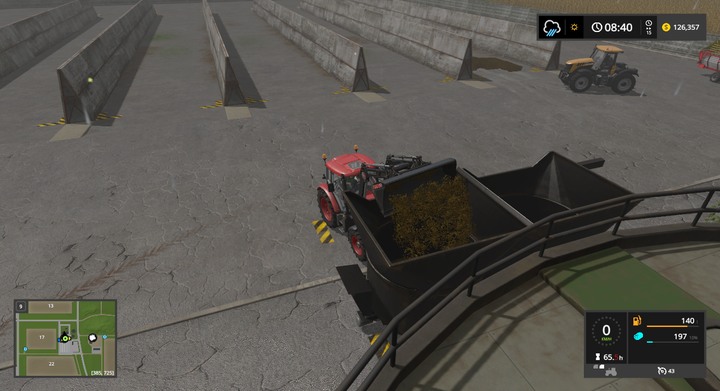
Ensilage is grass/chaff/hay after fermentation process. It is used as a source of the basic feed for cows, taking 50% of the need, and required component of the mixed feed. The second use of ensilage is the ability to create compost after delivering it to biogas plant. The compost is used to fertilize the field. Ensilage can be sold at the biogas plant, for about 400-600$/1000l, which makes it a nice business opportunity (all you have to do is transport the ensilage/bales, and unload them in the dedicated zone, throwing it to the black holes.
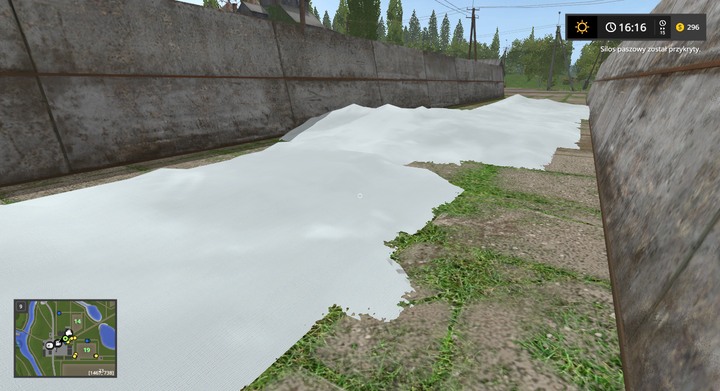
To receive ensilage, you need to transport grass or chaff to concrete prisms, required for the fermentation process. It takes place only after you fill the tank in at least 10%, and cover it (by approaching it using your character). Earlier, don't forget about tamping. When you open the help menu on the left, you'll see the state of filling and tamping, and after you close the lid - fermentation status. To proceed with this action, you'll need a tractor, and a roller. You need to ride on the transported grass, and you'll see that it is starting to level in the prism.
Notes - you cannot add grass to a fermented container and already made ensilage until you clear out the prism. For this reason, you should gather huge amounts of grass at once.
To receive chaff, you can also use special forage harvesters - the cheapest one costs 221 000$) + endings, so it's not a cheap tool. However, instead of such an expensive venture, buy an tractor extension (from the Forage Harvesters category) Pottinger MEX 5 (38 000$) and direct the pipe to the trailer, to receive corn chaffs.

The second method of acquiring ensilage is cutting the grass on meadows. Next step is making it into bales (the cheapest machine - New Holland Roll-Belt 150 - 58 000$), and wrap them with foil (Ursus Z-586 - 42 000$) - the fermentation process will begin inside the bales. It is a good method when you want to sell the ensilage or transport it to remote locations. It is also much more comfortable to deliver one bale of ensilage rather than load the ensilage from the prism using a shovel.
Note - the game suggests to press and wrap the hay. It is not mandatory - fresh grass can be processed in the same way, resulting in ensilage!
![Note nr 2 - the second device (New Holland BigBagger 1290 - 102 000$) creates bales of different shape (prisms), or cheaper ones [mentioned earlier] - cylindrical - Grass, Hay and Ensilage - Information on crops - Farming Simulator 17 Game Guide](/farmingsimulator17/gfx/word/447778655.jpg)
Note nr 2 - the second device (New Holland BigBagger 1290 - 102 000$) creates bales of different shape (prisms), or cheaper ones [mentioned earlier] - cylindrical. Only cylindrical ones can be wrapped with foil.

Both machines are very simple to operate. The bale press only requires delivering the hay from the bottom, driving on it (as in the case of the self-loading trailer) and every fill (4000l capability) you need to press the button to eject a complete bale, close the door, and drive further. Then, approach the bale using a wrapper - it will be automatically loaded, wrapped, and removed - ensilage is created instantly after wrapping, similarly to hay after foraying the grass.
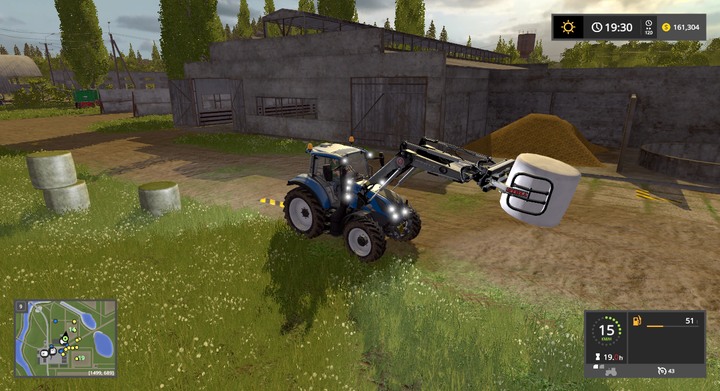
To gather the bales, use a front loader with a wrapped bale handler ( it is very useful, as you can catch every type of bale) or in case of transporting bigger quantities, any trailer (from Bale Technology - just take a look at the icons near the trailers (bale shapes).
You are not permitted to copy any image, text or info from this page. This site is not associated with and/or endorsed by the developers and the publishers. All logos and images are copyrighted by their respective owners.
Copyright © 2000 - 2026 Webedia Polska SA for gamepressure.com, unofficial game guides, walkthroughs, secrets, game tips, maps & strategies for top games.
